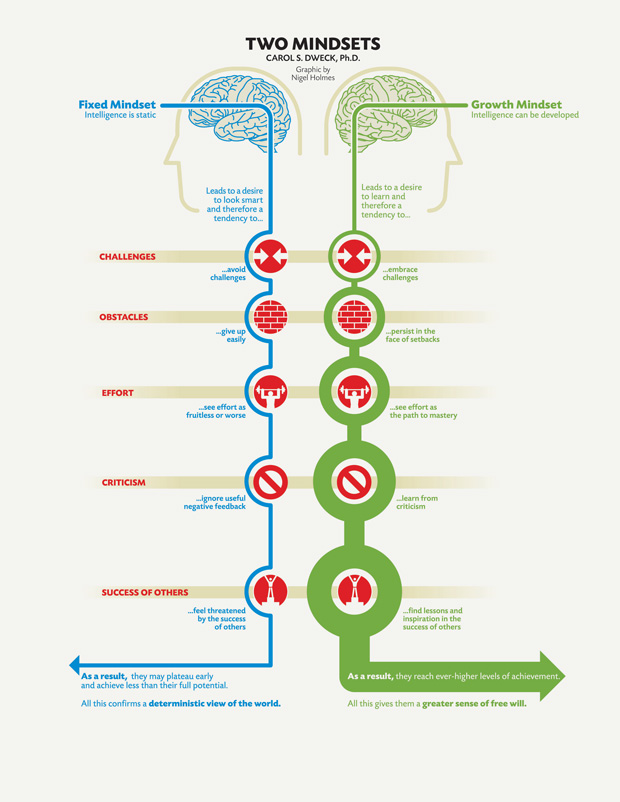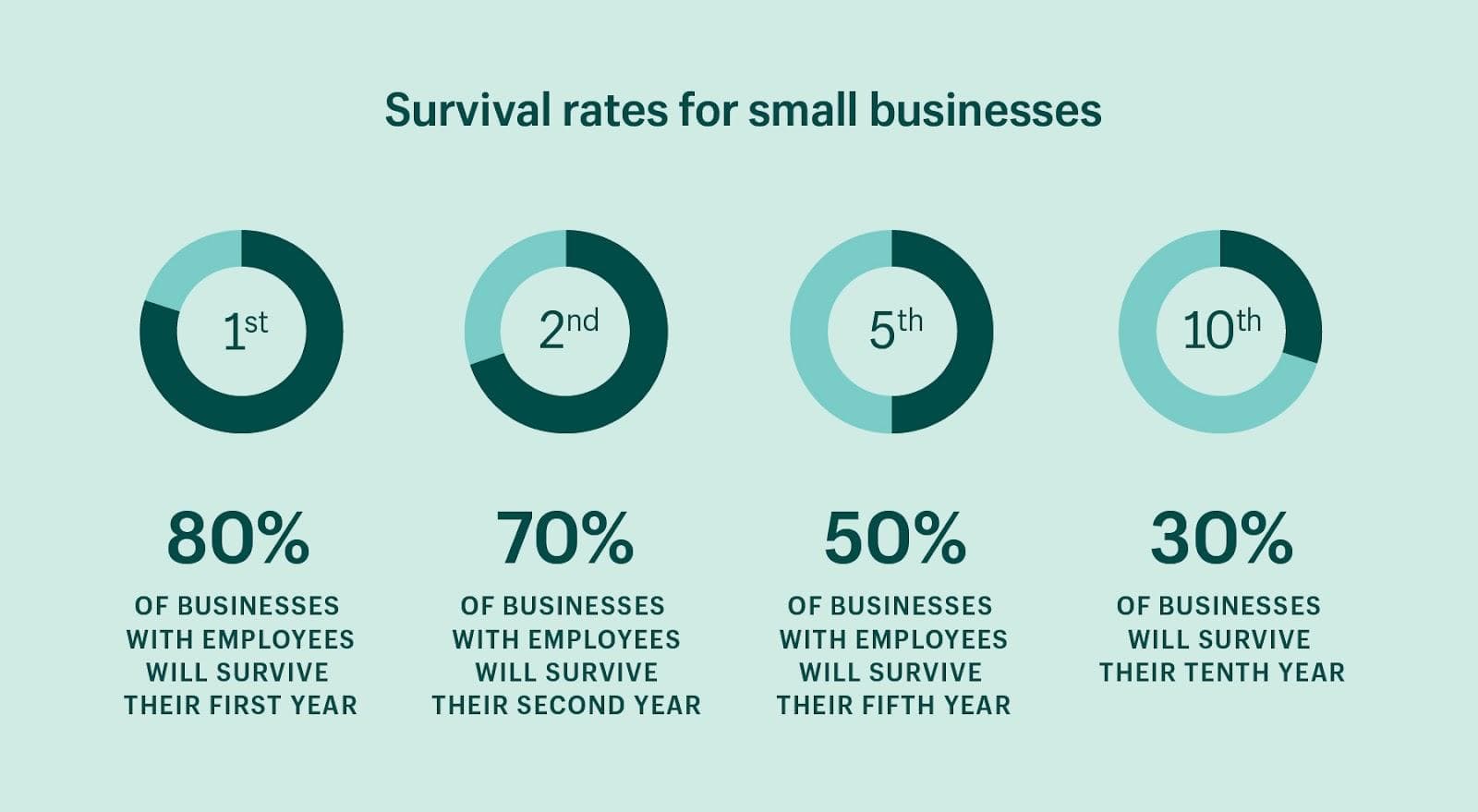In small business ownership, success isn’t solely determined by the products or services you offer, or the market conditions you face. Rather, it hinges on your mindset and ability to adapt and grow. Many small business owners face numerous challenges daily. How they face and overcome these challenges makes the difference between success and failure. This is where the concept of a “growth mindset” comes into play.
In this blog, we’ll define the growth mindset and explain why it’s essential for small business owners. We’ll discuss how you can adopt and nurture the growth mindset through real-world success stories like Netflix, Tesla, and Deel. We’ll also highlight a few tech tools like EdrawMax, Udacity, and teach:able to help foster a growth mindset and set you in the right direction.
Understanding the Growth Mindset
What is a Growth Mindset?
Coined by psychologist Carol Dweck, the concept of a growth mindset revolves around the idea that your abilities and intelligence can be developed through dedication, hard work, and learning. In contrast, a fixed mindset assumes that abilities are innate and unchangeable. Here’s a brief comparison:
Fixed Mindset: Belief that intelligence and abilities are static. Failures reflect personal limitations, leading to a fear of challenges and avoidance of risks. From our vantage point, many small business owners fall into this mindset, preventing growth and development.
Growth Mindset: Belief that abilities can be developed through effort and learning. Failures are viewed as opportunities for growth and learning, encouraging one to embrace challenges and take calculated risks.

Source: A Summary of Growth and Fixed Mindsets
Microsoft embodies a company that has gone all in on the growth mindset. Upon taking the helm as CEO at Microsoft, its leader Satya Nadella swiftly sought to implement a growth mindset culture. The growth mindset culture at the company consists of several components:
- Empathy
- Listen & Learn
- Live the Culture
- Sense of Belonging
- Curiosity
- Collaboration
The shift from a know-it-all to a learn-it-all culture has had a transformative impact on the company, its customers, investors, and other stakeholders. Since taking over as CEO, the company has seen significant improvements in innovation and business segment performance. Most importantly, shareholder value has increased from US $300 billion to over $2 trillion.
The concept of the growth mindset continues to evolve. Moreover, this leadership and success mindset is part of a growing trend among thought leaders to focus on the upside, looking beyond one’s limitations. There is the infinite vs. finite mindset by Simon Sinek as well as the abundance vs. scarcity mindset by Steven Covey.
The Impact on Business Success
Starting, managing, and growing a small business is challenging in any environment. Additionally, the list of challenges small business owners face is long. These challenges include fierce competition, economic and market fluctuations, strategy decisions, etc. Moreover, failure rates remain high, as only 50% of US small businesses make it to the 5th year. However, successfully overcoming these challenges partly depends on adopting the right mindset.

Source: Commerce Institute, US Small Business Administration
Avoiding the Trap of Small Business Failure
Let’s explore some ways in which a growth mindset can positively impact your business, allowing you to leapfrog the failure trap:
- Resilience: With a growth mindset, setbacks are viewed as temporary and surmountable obstacles rather than insurmountable roadblocks. This resilience can help you bounce back from setbacks and stay committed to your business goals. For example, the Covid-19 pandemic tested the resilience of many small businesses. In April 2021, 70% to 80% of small businesses experienced revenue declines of 30% to 50%.
- Innovation: A growth mindset encourages creative thinking and experimentation. Business owners embracing this mindset are more likely to seek innovative solutions to problems and adapt to changing market conditions.
- Learning Orientation: Small businesses often require constant learning and adaptation. Many small business owners face knowledge deficiencies in multiple areas, including leadership, planning, product development, and financial analysis. However, a growth mindset fosters a love for learning and a willingness to acquire new skills and knowledge, essential for staying competitive in the new knowledge economy.
- Risk-Taking: As a small business owner, taking calculated risks is often necessary for growth. Additionally, risks always occur when building new partnerships, entering new markets, or other initiatives to expand your businesses. However, those with a growth mindset are more likely to take risks because they see failures as opportunities to learn and improve.
Now that we understand the significance of a growth mindset for small business owners let’s explore practical strategies for adopting and cultivating it.

Cultivating a Growth Mindset for Small Business Success
1. Embrace Challenges
A key aspect of a growth mindset is seeing challenges as opportunities rather than threats. Encourage your team to take on challenging projects and tasks, and emphasize that mistakes and setbacks are part of the learning process. Most importantly, when mistakes occur, learn from them. Develop a system of best practices to avoid repeating the mistakes. Doing so creates an environment where innovation and growth can thrive.
2. Promote a Culture of Learning
A desire for knowledge and continuous learning is at the heart of a growth mindset. Encourage employees or teams to seek training and development opportunities through online courses, workshops, or industry conferences. Invest in their growth, and they will, in turn, contribute to the growth of your business. MOOC platforms like Udacity offer owners and employees access to knowledge and learning.
3. Encourage Risk-Taking
Innovation often involves risk. Foster an environment where calculated risks are encouraged, and employees feel safe sharing their ideas, even if they might not always succeed. Unfortunately, in most organizations, a blame culture persists. Ultimately, the blame culture prevents risk-taking. However, it’s important to celebrate both successes and valuable lessons learned from failures.
4. Emphasize Effort and Persistence
In a growth mindset culture, the emphasis is on effort and persistence rather than on innate talent. Tenacity is key. So is a learning-by-doing culture. Praise your team for their hard work, dedication, and resilience. When employees see that their efforts are valued, they are more likely to tackle new challenges enthusiastically.
Mediocrity has a powerful gravitational pull, do not fall into its orbit.
ClearSky 2100 Ventures
5. Monitor and Adjust Your Mindset
As a business owner, your mindset sets the tone for your organization. Be aware of your mindset and work on cultivating a growth-oriented perspective. Seek feedback from mentors, advisors, or business coaches who can provide valuable insights. More importantly, be mindful of and avoid cognitive biases and mediocrity. These can be destructive and serve as an impediment to growth.
6. Learn from Your Competitors
Competitors can be a valuable source of learning. However, rather than viewing them as threats, analyze what they are doing well and where they might fall short. Use this information to adapt your strategies and stay competitive.
Real-World Examples of the Growth Mindset in Action
Netflix
Netflix, the streaming giant, is a prime example of a company that has embraced a growth mindset. Founded in 1997, it started as a DVD rental service and transitioned to online streaming, continually adapting to changing technology and consumer preferences. However, their willingness to take risks, learn from failures, and innovate has made them a leader in the entertainment industry. For example, one of the most notable events in the company’s history was its failed sale in 2000 of the business to Blockbuster, the then-leading DVD rental business, for $50 million. Today, Netflix is present in 190 countries and boasts a market cap of over US $160 billion. Moreover, Blockbuster, its competitor and largest player in 2000, is a former shell of itself.
Tesla
Tesla was founded in 2003 by Martin Eberhard and Marc Tarpenning. In 2004, Elon Musk became an investor and board member. He took the helm as CEO in 2008. In addition to an investment, Mr. Musk brought a broader vision and a growth and transformative mindset. The company went public in 2010.
During its existence, Tesla and Elon Musk have faced many setbacks. Setbacks included challenges along the technology adoption curve, product quality, manufacturing processes, and intense investor skepticism. Many of these setbacks frequently caused investors to question the company’s long-term viability. However, Elon Musk consistently tackles ambitious projects and is unafraid of setbacks.

Elon Musk’s Ability to Overcome Challenges
Musk’s willingness to learn from failures and persist in the face of challenges has led to groundbreaking innovations in electric vehicles and space exploration. We’ve seen these attributes in his other ventures, such as Space X and Neuralink. In both Tesla and Space X, he brought key elements of the growth mindset: resilience, risk-taking, and innovation.
More importantly, Elon Musk’s mindset sets the tone for the organization with the ability to drive others to his vision. Recently, his acquisition of Twitter and rebranding to X has caused some to cast doubt on the viability of the social media platform. However, if history is any guide and the growth mindset framework is applied, success is a real possibility.
Today, Tesla thrives as Mr. Musk’s’ vision of a ubiquitous electric vehicle market continues to materialize. In 2022 it produced 1.3 million vehicles and its current market cap exceeds US $780 billion, more than the market cap of the next 8 largest companies combined. Additionally, investors continue to jump on the bandwagon, with some forecasting a US $4 trillion market cap by 2030.
Deel
Deel is currently the world’s largest all-in-one integrated HR platform, allowing companies to hire anyone anywhere compliantly in as little as 5 minutes. Today, Deel is present in over 160 countries and sees itself as a catalyst for a globally optimized and mobile workforce. However, unlike the other two examples, Deel was founded in 2018 by MIT alums Alex Bouaziz, CEO, and Shuo Wang, Chief Revenue Officer. Both founders bring a growth mindset to managing the business.
Moving at hyper-speed, in 2022, Deel became the fastest SaaS start-up in history, reaching US $100 million in annual revenue in just 18 months. The company is also known for Deel Speed, a philosophy that focuses on getting things done both internally and with external partners. Additionally, the company continues to demonstrate an ability to rapidly learn from mistakes, understand its customer needs, and innovate, staying one step ahead of the competition. Today, Deel is valued at $12 billion based on its recent funding round, with much more growth ahead.
Tech Tools to Nurture the Growth Mindset
A fundamental premise of the growth mindset is that it is something that one can develop through effort and learning. While there is no shortage of technology tools to help in this regard, below are a few of our favorite resources
EdrawMax by Wondershare is a versatile diagramming software with a surprising strength in mind mapping and project planning. While it offers a vast library for flowcharts, network diagrams, and even floor plans, EdrawMax shines in its ability to visualize ideas and organize projects.
The mind mapping feature boasts a user-friendly interface with drag-and-drop functionality. Brainstorming sessions become effortless with the ability to add and connect topics quickly. EdrawMax provides a plethora of customizable shapes, colors, and connectors, allowing you to tailor your mind map to reflect your thought process perfectly.
Even more impressive is the software’s integration between mind maps and project planning tools. You can seamlessly convert brainstorming topics into actionable tasks within EdrawMax. This functionality eliminates the need for multiple programs and keeps your project vision centralized.
However, due to the extensive features offered, EdrawMax might have a slight learning curve for beginners. The desktop-only application could also be a drawback for those seeking cloud-based accessibility.
Overall, EdrawMax is an excellent choice for visual thinkers, project managers, and anyone who needs a powerful tool to organize ideas and plan projects effectively. Its mind mapping and planning capabilities make it a standout option in the diagramming software market.
Udacity is an online learning platform that offers a wide range of courses and nanodegree programs in tech-related fields such as programming, data science, artificial intelligence, and digital marketing. It is known for its project-based approach to learning, where students work on real-world projects to gain practical skills. Udacity collaborates with industry partners to develop its content and focuses on providing learners with job-ready skills. The platform offers flexible learning options, including self-paced courses and mentorship programs, making it accessible to diverse learners seeking to advance their careers in the tech industry. The company recently introduced an all-access tier, opening up its entire catalog of courses for a fixed price.

Teachable is an online learning platform allowing individuals and organizations to create and sell online courses. Users can easily design, customize, and launch their courses on Teachable’s platform, including video hosting features, content management, and marketing tools. Teachable provides tools for course creators to set pricing, enroll students, and track their progress. It also offers various customization options to maintain a unique branding experience.
Commitment and Focus are Key
Finally, what’s nice about the growth mindset is that it can be embraced by almost everyone. However, not everyone will embrace it. In small business ownership, success hinges not only on external factors but also on your mindset. A growth mindset empowers you to navigate challenges, embrace opportunities, and continuously learn and adapt. Most importantly, making it work requires commitment and focus.
In the US, there are over 30 million small businesses, and worldwide, there are over 500 million. Most businesses will follow a traditional development path of growth and decline. Some will experience growth and expansion, and a much smaller number will emerge as unicorns. For the small business owner, the journey to a growth mindset starts with a choice. Embrace the power of growth and watch your small business flourish.
Disclosure: At ClearSky 2100, our portfolio partly consists of affiliate partnerships. We may earn a small commission from buying links on our site at no cost to you.





